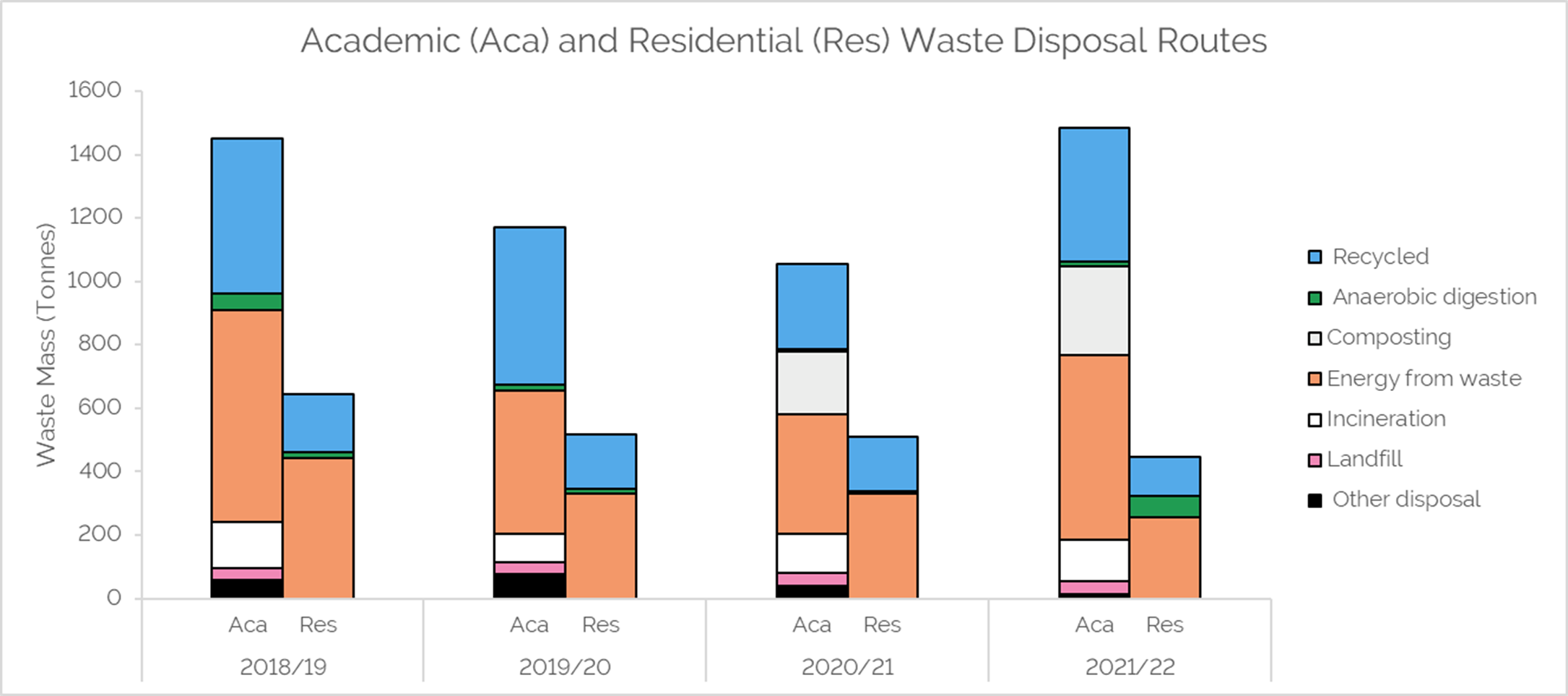Waste and Recycling
Standing by the principles of reduce, reuse, recycle
Newcastle University produces a significant amount of waste. From everyday recyclables and food waste, to waste from labs such as glassware and chemicals, and office furniture and electrical equipment.
Managing waste at the University is an exciting challenge! The University is committed to its Sustainable Waste Management policy and the principles of Reduce, Reuse, and Recycle.
We cannot stop producing all waste, but together everyone can make a significant contribution to reducing and managing our waste in a sustainable manner.

Think before you print: only print when necessary, and make it double sided when you do. Use electronic versions for policy/strategy/guidance documents where possible.
Get rid of junk mail and unwanted subscriptions. Unsubscribe to services or opt for paperless communication.
Use a reusable coffee cup instead of paper cups for your hot drinks and receive a discount at EAT@NEWCASTLE venues.
Use a reusable bottle and drink tap water instead of buying bottled water.
Bring in lunch from home, made with the contents of your kitchen rather than buying a packaged lunch. Take your reduction mind-set back into your home by reducing packaging there as well and using resuable containers and buying loose food. Check out:
- Grainger Market for The Weigh House, Nil Living and various loose produce sellers
- Church of St Thomas the Martyr shop, Haymarket Lane for cleaning product refills
- Love Food, Hate Waste for food waste reduction guidance
Consider your purchasing needs. Is the equipment, furniture or chemical already available within the University? Join the Furniture Reuse mailing list to request and advertise furniture, office supplies, equipment and more.
Service equipment regularly to ensure it is in optimum condition and has a long life.
If buying new equipment is unavoidable, make energy efficient purchasing choices. Assess whole life costing. Sometimes the cheapest option ends up being the most expensive when it breaks and needs replacing often.
Put the principles of Green Chemistry in place in your experiment design. Green Chemistry utilises a set of principles to reduce or eliminate the use or generation of hazardous substances in the design, manufacture and application of chemical products.
The SIN (Substitute It Now!) List is a comprehensive database of chemicals likely to be restricted or banned. It is publicly available, regularly updated, and provided completely free of charge by non-profit organisation ChemSec.
Remember, reducing the amount of waste you produce is the best way to help the environment! But if you cannot avoid producing the waste, try reusing it...
Reuse
With more than 6,000 staff and 25,000 students, the University is like a small town. Often, when someone has something they don’t need, it's exactly what someone else is looking for.
Sharing equipment and furniture that is no longer of use saves money. It also saves energy, raw materials and precious time, which could be put back into research and development.
The Furniture Reuse mailing list is an informal way for colleagues to share items that they no longer need with a wide range of people across the University. Estates and Facilities may also utilise this mailing list to advertise larger collections of furniture that are available for the University community to reuse.
To sign up, send an email to sustainable-campus@ncl.ac.uk with the subject 'Join Furniture Reuse'.
To be removed from the list, please see NUIT's guide to unsubscribing from mailing lists, or simply email the Sustainability Team on the above email asking to be removed.
Dispose
There will always be a fraction of our waste that we cannot recycle. That doesn't mean that all of this waste must end up in a landfill.
General waste
Our contractor takes our non-recyclables and bails it to create a Refuse Derived Fuel. This RDF is then burnt in Energy from Waste plants to generate heat and power.
Skips
If you are having a clear-out or have lots of rubble, scrap or other materials to dispose of, you can order a skip from the University waste contractor.
Please note that all skips must be enclosed and locked when not being used.
A flat haulage rate of £68.96 will be charged, plus tonnage dependent on the waste stream.
All prices are exclusive of VAT.
| Waste type | Cost |
|---|---|
| General waste | £108.21 per tonne |
| Wood | £10.61 per tonne |
| Construction and demolition rubble | £84.87 per tonne |
| Metals | Free of charge |
If you need to decide if a waste is hazardous, you should refer to the UK Government website on how to classify different types of waste.
If you have hazardous waste, you must:
- segregate it from non-hazardous waste
- ensure it is dealt with by a suitably qualified hazardous waste contractor
WM3
WM3 is the Guidance on the classification and assessment of waste: Technical Guidance. It replaces WM2 (Hazardous Waste: Interpretation of the definition and classification of hazardous waste).
The guidance explains how to assess if a waste displays a hazardous property and how to classify it.
In all cases, academic and service units are responsible for the safety of the waste that they generate. Please contact your safety officer for advice.
This procedure satisfies safety concerns, Duty of Care and encourages producer responsibility.
See the general hazardous waste guidance provided by the Environment Agency.
If you are unsure whether your waste product should be classified as hazardous, please contact sustainable.campus@ncl.ac.uk for advice.
Records
As a hazardous waste producer, you need to keep records of all hazardous waste, including WEEE and chemicals. You must maintain records (waste consignment notes) of each waste involved in a register.
You must also be able to supply specified information to us or the emergency services, when required to do so.
A Premises Code must now comprise of the following:
- The first six letters of the code must be the first six letters of the business name. For the University, it will be 'NEWCAS'.
- This is followed by five characters that are unique to each waste movement. These characters will be generated by the waste contractor.
An example of a consignment note code would be 'NEWCAS/1234L'.
As a hazardous waste producer, you must keep records of all hazardous waste, including WEEE and chemicals.
A Hazardous Waste Consignment Note (HWCN) is provided with every collection of hazardous waste. Here are some important things to remember about consignment notes:
- You must keep copies for three years.
- A representative from the service or unit that produced the waste must sign the HWCN. There is a checklist of the important fields to check before signing the note at the bottom of this page.
- You must make sure that copies of consignment notes are stored in a safe place. They must be available for checking by the University or emergency services wherever required.
- The waste removal company provide hazardous waste returns every quarter. Keep copies of these with the HWCNs.
Fields to check on HWCNs
| Field | Description |
|---|---|
| Date of Transfer | |
| Name and Address of consignor | Producer's name and site's address |
| Adequate description of waste | Brief but accurate description of the waste |
| Hazardous Waste Registration Number | Check that it is included |
| EWC code | Check that it is included |
| Type of Waste container | Bag / cart / bin / uncontained |
| Company name and address of waste carrier | Contractor name and address |
| Representative name and signature of consignor | Site representative (waste producer) |
| Representative name and signature of consignee | Contractor representative (waste carrier) |
| Waste carrier's licence number | |
| Declaration of waste hierarchy | Statement about how the waste is disposed Waste Hierarchy: Reduce - Reuse - Recycle - Recovery |
| SIC code | Check that it is included |
| Signature | Check waste carrier signature and sign yourself |
Please see the Waste A-Z to find out what can be recycled and what should go down other waste streams.
If you need further advice, please contact us at sustainable-campus@newcastle.ac.uk.
We often receive requests for bins for very specific/narrow/niche waste streams, e.g. for cosmetics, coffee pods, pet food packaging etc.
In order to keep our recycling streams simple and easy to use we only focus on segregating material the University directly produces. If you have identified a waste stream that the University directly produces that is not currently recycled by the University, please email us at sustainable-campus@newcastle.ac.uk and the team will assess whether the type and volume of waste you produce is sufficient to implement its own scheme, and how feasible this would be.
If you’re unsure about what can and can’t be recycled, see our Waste A-Z. If your item isn’t listed there, please email sustainable-campus@newcastle.ac.uk and we can advise you.
Compostable items at the University include food waste and manufactured plant-based materials like cups, mugs, trays and cutlery. These two types of waste are disposed of differently.
Food waste
Both cooked and raw food can be placed in food waste bins. These bins are small, green benchtop caddies and are found in kitchen and common room areas across the University. If you don't have a food waste bin in your local kitchen or common room, please let us know by emailing sustainable-campus@newcastle.ac.uk. For more information on what happens to food waste, please see our dedicated food waste page.
Manufactured, compostable materials
Compostable cups, mugs, containers and cutlery must be disposed of in the general waste stream. These bins have black lids and a 'General waste' sticker on them. They cannot be put in the food waste stream using the food waste caddies because they will disrupt the anaerobic digestion process. We do not have a composting waste stream at the University and the UK, in general, does not have a high capacity for industrial composting, which is what is needed to treat these manufactured materials. They cannot be put in the paper waste stream because these products are not made in the same way or from the same things as paper.
Although manufactured compostable materials can't be composted at the University (see 'Where do compostables go?'), they are still preferable to plastic alternatives because reducing our single-use plastic usage means we are reducing our reliance on fossil-fuel based products.
However, all single-use items have a high carbon footprint, so we should reduce our usage of single-use compostable materials as well as single-use plastics. You can play your part by using your own reusable bottles, cups, lunchboxes, cutlery and bags, and eating in at EAT@ outlets which use reusable receptacles and cutlery.
There are water bottle refill points across campus which are mapped on this Campus Map. EAT@ also offer a discount on every coffee you buy using a reusable cup.
